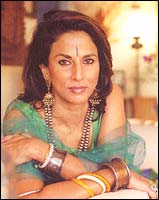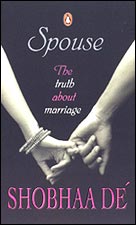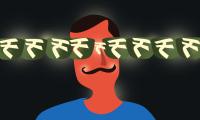 er handsome south Mumbai flat is decked with antiques, heavy silver artifacts, large vivid paintings and rich colours.
er handsome south Mumbai flat is decked with antiques, heavy silver artifacts, large vivid paintings and rich colours.
Interspersed between them are beaming photographs of her children; a contented portrait with her husband; a busy, buzzing kitchen; an Irish setter running in and out... there is a warm, lived-in feel.
The phone constantly rings with calls from her six kids (four girls and two boys).
 At 57, Shobhaa Dé, casual but chic in a cool cotton skirt, sleeveless blouse and colourful scarf around her neck, glows. Her conversation is an engaging mix of compelling anecdotes and strong views. Energy brims from the fine-boned, animated face.
At 57, Shobhaa Dé, casual but chic in a cool cotton skirt, sleeveless blouse and colourful scarf around her neck, glows. Her conversation is an engaging mix of compelling anecdotes and strong views. Energy brims from the fine-boned, animated face.
"I can never take a neutral stand," she declares in the course of the interview. You know you've just hit on Dé's mantra in life.
Shobhaa Dé is a bestselling author of 13 controversial books (her first novel, Socialite Evenings, collected a record number of critical reviews and sold a record number of copies). Her subjects have ranged from Mumbai's frilly, trite social life to surviving men.
This time around, after a gap of five years, Dé -- who began her career as a journalist and has edited three popular magazines (Stardust, Society and Celebrity) -- has written a hefty, 287 page book celebrating the virtues of marriage.
Spouse offers commonsensical and anecdotal advice on improving marital relationships in modern, young-urban India. It dwells on the spirit in which a young person should approach their shaadi.
Marriage, in fact, is an area where Dé feels no neutrality. She firmly believes in it which is why, she says, her book was written from her heart.
After an unsuccessful first marriage, she has been married for over two decades to businessmen Dilp Dé.
Shobhaa Dé spoke to Deputy Managing Editor Vaihayasi P Daniel:
Why do you feel you are qualified to write a book on marriage? Why did you decide to write a book?
It is a subject I feel very passionately about. I am not saying I have all the answers. And I am not saying, "Hey guys, look at me: I have the perfect marriage and you can have it too." It is not one of those books.
It a cold, hard look at an institution. Marriage is becoming like the dinosaur. It is going to be extinct very soon. That is what I feel.
Marriage is one of the most enigmatic, most fascinating relationships on earth.
I also think that marriage in urban India has undergone such a radical redefinition, which is maybe why a lot of young people are questioning the very dynamics of marriage, the politics of marriage, the power games within marriage.
This [book] is just a way of putting it all on the table, and saying, "Hey guys, this is it. This is my take on it."
I am sure we all have our own takes on it because nobody outside the marriage --- any marriage -- can actually figure out what makes those two people stick together, what makes that marriage tick and what it is that makes that marriage more stable than another person's marriage.
No one, but no one, has been able to decode that.
I find I have a continuing, obsessive interest in the subject.
 At what age group is your book directed? Is it the younger people?
At what age group is your book directed? Is it the younger people?
It is not really a book that is about market segmentation. It is not a research project I am sharing with the world.
It is a book written from the heart. I really cannot say... I cannot say it is meant for men or for...
Who do you think it will appeal to?
I imagine [it would appeal to] young married couples or people who are about to get married or people who are even questioning marriage and would be curious to know why somebody would recommend marriage as strongly as I am.
Because I am really endorsing marriage. I am saying this is what I believe is in the best interest of people who actually want marriage.
I am talking to the converted in a way. I am talking to believers. And if I can convert those who are sceptical or sitting on the fence, great!
Aren't the case studies and the problems of the married couples outlined in your book the problems of wealthy south Mumbaikars? They don't seem to be the issues concerning double-income ordinary suburban families.
[They are] very much [the problems of double-income suburban families]!.
The women in the Double Income No Kids marriage are the ones who drive the changes [in marriage relationships] to begin with.
There would have been no questioning of marriage, as we have always known it, had it not been for women pushing that change and being the drivers of that change.
The only reason for a change to be sweeping [India] is because it is socio-economic. With women contributing equally to the family kitty, they are also questioning the laws and rules of marriage. They are far more assertive about what they expect of a marriage and they are more assertive about articulating their disappointments. The shift has come about because of that.
I don't think men have changed all that much. Their viewpoint remains consistent and has remained consistent for centuries.
Marriage has always been pretty much on a man's terms and not a woman's terms. Not just in traditional society but all over the world. And the old reasons for marriage -- like security, children -- are being stood on their head.
The new reasons interest me much more. The new reasons are not being driven by richie-rich wives but very much by working women.
DON'T MISS
Exclusive excerpts:
Shobhaa De: Complete coverage!








